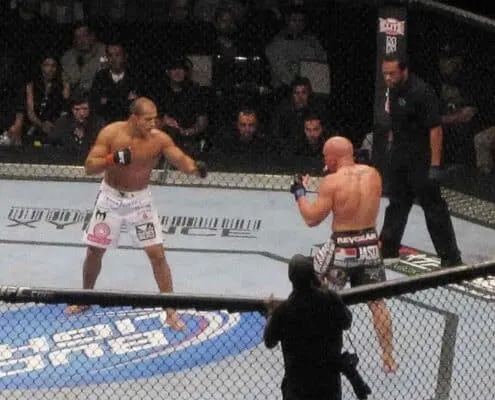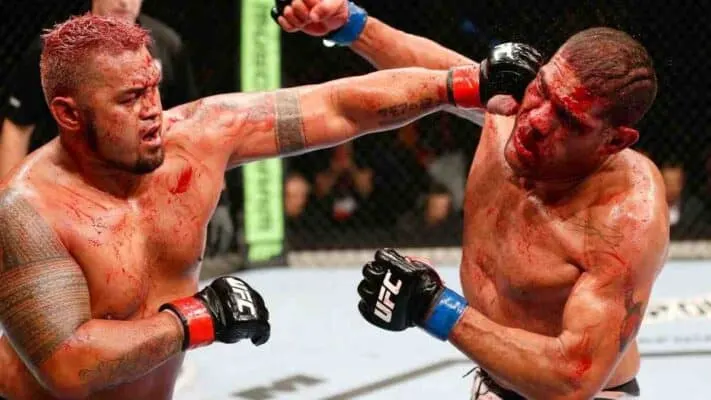
MMA is a combat sport where you can’t see your favorite athlete compete every week or month. In fact, it may pass over a year until you can see them fight again. But why do UFC fighters compete so rarely, and why do some fighters compete more than others?
UFC fighters typically fight 2-3 times per year. Unranked and low-ranked fighters compete up to 5 times per year, whereas top-ranked fighters typically fight 1-2 times per year. Injuries, contract disputes, and medical suspensions are some reasons that impede fighters from competing more often.
In this article, I will further explain how often do UFC fighters fight, and why some athletes compete more than others.
How Often Do UFC Fighters Fight Per Year?
Champions and top 10 ranked fighters fight once or twice per year can be attributed to one of the following reasons:
- Lack of PPV events – UFC holds around 12 pay-per-view events every year, and these high profile events are where champions defend their titles. If you consider that there are 12 UFC champions in total, you get why most champions fight only once per year as there are simply not enough pay-per-view events.
- High level competition – top level competition is much tougher and the risk of losing is much higher so top fighters prefer to take more time to prepare, and they usually avoid short notice fights. Simply put, top-ranked fighters are far more cautious about agreeing on who they fight and this may delay their next fight.
- Work outside the UFC – high profile fighters are quite busy with building their brands, starting their own business, and doing a lot of media work.
Low-ranked and unranked fighters tend to fight more often. Some of them even compete up to five times per year as Kevin Holland did in 2020. The main reason is the fact that low-ranked fighters are eager to move up the UFC ranking, thereby accepting more fights with the aim of winning them all.
It doesn’t matter if it is a short notice call or they are not 100% ready, most low-ranked fighters are likely to accept any offer from the UFC. If they don’t, this means that some other fighter might seize their opportunity to move up.
In general, fighters outside the rankings also earn less money than ranked fighters do. For this reason, there’s a financial incentive for unranked fighters to accept more fights to earn as much as they can while climbing up the ranking.
RECOMMENDED FOR YOU: How Much Do UFC Fighters Earn? – Here’s a Closer Look
Why Do UFC Fighters Compete So Rarely?
The following is a list of the main reasons why UFC fighters compete rarely:
- Medical suspensions
Medical suspensions are the most common reason why UFC fighters have to wait a couple of months before they can compete again. Depending on the severity of injuries they have sustained in a match, fighters get from 30 days to 6 months medical suspensions.
After the fight, every fighter has to go through a post-fight medical check. If the fighter gets knocked out unconscious or suffers severe head injuries, the medical suspension, in that case, ranges from 3 to 6 months. In this time span, they are not allowed to spar or compete until the suspension expires. They get a couple of weeks for less severe injuries.
- Injuries
MMA might be physically the most demanding combat sport. Fighters need to train up to 3 times per day 6 days a week to improve their game and prepare for a match. Training this much and sparring all the time means that UFC fighters are prone to overtraining and injuries. Sometimes, they can fight through the injury and show up on fight night, but in other cases, they must pull out of the fight and take a break of a couple of weeks or months to heal.
- Match-making
Match-making is a complicated job because matchmakers need to deal with over 600 fighters on the UFC roster. On the other side, there are around 40 events per year (pay per view and fight night), and it’s really hard for matchmakers to offer all the fighters more than 3 fights per year.
Out of these 600 fighters, many of them deal with injuries, contract disputes, or medical suspensions. But still, it would be mathematically impossible for matchmakers to give all healthy fighters a chance to fight 5 or 6 times per year as there are simply not enough events.
- Weight cutting
All UFC fighters go through a grueling weight-cutting process where they lose up to 20 pounds in a week leading up to a fight. They do this to compete in the weight class below their natural one and gain a physical advantage. However, cutting this much weight in a single week is fraught with danger, and it puts both your mind and body through huge stresses.
After the fight is over, fighters need to spend some time recovering their body and mind from weight cutting. They can’t just take one week off and then go through another weight-cutting process. This is very dangerous and can lead to long-term health issues, and even be lethal in some cases.
- Refusal to fight
UFC fighters, notably the ones who compete at the top level, often refuse to fight. In most cases, fighters who refuse to fight do that because they think their opponent is below their level and that they don’t have anything to gain in that fight. For instance, a #5 ranked fighter on a winning streak might refuse to fight against the #10 ranked fighter. They have nothing to gain in that fight, but on the other side, might risk losing a top 5 status in that division in the case they lose.
They also might refuse to fight because they want more money, or maybe they have a contract dispute with the UFC.
- Personal issues
MMA fighters are humans too and they face various personal issues as all people do. Sometimes, they need to take a break to deal with the loss of the loved one, fix their marriage, spend more time with the family, or even bounce back from depression. One of the fighters who battled with depression was Ray Borg, and he refused a couple of offers from the UFC because he was coping with depression.
What Happens If You Decline a Fight In UFC?
Yes, fighters can decline the fight offered by the UFC and this happens all the time. Although they are under a contract with the company, fighters don’t have to accept the fight every time the matchmaker calls them. After all, no one can force a fighter to accept a fight offer if he/she doesn’t want to fight. But bear in mind that declining the fight comes at a certain price, notably when it comes to unranked fighters who are still working their way up and are yet to prove that they belong in the UFC.
First of all, fighters may have dozens of legitimate reasons to decline the fight. They might be dealing with injuries, medical suspensions, or some private issues within the family. In that case, the UFC would just search for someone else and offer you another fight once you heal up and start training.
But, some fighters may decline the fight because they want more time to train, money or they simply don’t like the opponent. In that case, the UFC would accept their decision and maybe offer them another fight in the near future. However, UFC may view this fighter as unreliable and would not give them the same treatment as they would to other fighters who are always willing to fight.
For instance, the next time a big opportunity comes around, they would not call you but rather a fighter who is eager to seize every opportunity to move up the rank to get a title shot.
The story is a bit different for high-level fighters who are a big part of the UFC brand and who bring a lot of value to the company. These fighters have higher negotiating power and can decline the fight if they are not satisfied with the terms without consequences.
How Bad Do MMA Fighters Get Hurt?
According to data, MMA is a sport with the highest rate of injuries out of all combat sports. The worst type of injuries come via brutal knockouts, which may result in long-term brain damage like CTE. Fighters also often sustain various other serious injuries like:
- Fractures (broken ribs, hands, legs, noses, jaw, orbital bone)
- Torn ACL, PCL or meniscus
- Joint dislocations
- Muscle tears or strains
- Deep cuts

Shortly after the bout, most fighters would not feel much pain due to high adrenalin. But the morning after the fight is probably the worst because this is where they start feeling every single punch or kick they have absorbed in a fight. Depending on the outcome, some fighters might feel light pain while others might feel like they have survived several car crashes.
“I think the thing that stands out the most is just being so sore that I can’t tie my own shoes, my wife will have to put my shoes on and tie my laces for me … I can’t touch my fingers to my thumbs. I had a couple of fights where my hands swelled up like lunchboxes after.”
— UFC lightweight, Scott Holtzman (source)
Even if the fight goes well, most fighters would need a couple of weeks or months to feel normal again. Despite not absorbing much damage, their hands, legs, and elbows would feel sore, and they might have headaches and neck pain for a couple of days as well. And they also need to recover their bodies from brutal weight cuts.
It’s worth bringing up that fighters also get injured a lot in training. MMA fighters train up to 3 times a day, 6 days a week, and they do a lot of sparring which is very hard on their bodies. On a daily basis, they trade punches, kicks, powerful takedowns, slams, roll on the ground and practice submissions. Spending that much time on the mats hand to hand fighting with other skilled athletes significantly increases the rate of injuries, and this is the main reason why they get injured all the time.
RECOMMENDED FOR YOU: Do MMA Fighters Get Brain Damage?
How Often Do UFC Fighters Train?
Outside the training camp, most fighters hit the gym around 5 to 6 times per week, and they spend around 2 hours working out. They do this to stay in shape, maintain a healthy weight and work on adding new skills and weapons.
But once inside the training camp, UFC fighters train at least 2 times a day, 6 times a week. Some fighters go even further by training three or four times a day leading up to a fight. But the exact number depends on their schedule and the intensity of these workouts. For instance, they don’t spar every day or exhaust themselves by doing high-intensity strength and cardio workouts all the time. No, their training schedule needs to be well balanced to prevent overtraining and potential injuries.
Their weekly training schedule is a mix of striking, grappling, and ground fighting sessions. On top of that, they need to work on their strength and conditioning and maintain a healthy diet.
RECOMMENDED FOR YOU: Why Are MMA Fighters Skinny And Don’t Have Big Muscles?
Who Had The Most UFC Fights In a Year?
As of 2022, the record for most fights in a year belongs to 10 UFC fighters who all had five fights each. Here is a list of all the record holders:
- Chris Leben (5 fights in 2006)
- Roger Huerta (5 fights in 2007)
- Donald Cerrone (5 fights in 2011)
- Daron Cruickshank (5 fights in 2014)
- Neil Magny (5 fights in 2014/2015)
- Uriah Hall (5 fights in 2015)
- Ross Pearson (5 fights in 2016)
- Thiago Santos (5 fights in 2018)
- Greg Hardy (5 fights in 2019)
- Kevin Holland (5 fights in 2020)
However, it’s worth bringing up that only Neil Magny, Kevin Holland, and Roger Huerta were able to win all five fights in a single year. The second place belongs to Thiago Santos and Donald Cerrone who had four wins.
What Do UFC Fighters Do After a Fight?
It really depends on the outcome. First, they have to go backstage where they have to go through post-fight medical checks before they can start doing interviews and other media work. After that, some UFC fighters would leave the arena and go home or directly on vacation, while in other cases, they might end up spending a couple of days in the hospital. But in most cases, they would go home to recover from the injuries alongside their family and friends.
The thing is, UFC fighters spend around 2–3 months preparing for a fight. While in training camp, they go to the gym up to 4 times a day, and they do this 6 times a week. Some of them even travel to different states to train with top coaches, which means they are away from home for a couple of months. So once it’s all over, most of them prefer to stay away from the media and training for some time and focus on resting and spending time with their families.
What Is The Minimum Recovery Time For a UFC Fighter Between Fights?
There is no such thing as the minimum recovery time. If a fighter sustains an injury in a fight, they must fully recover to be medically clear to compete again. How many weeks or months that would take depends on the type and severity of the injury they have sustained.
On one side, a fighter who got the job done without getting injured would be medically clear to fight the next week if they want. On the other side, a fighter who got knocked unconscious could be out of competition for up to six months.
RECOMMENDED FOR YOU: Why Do MMA Fighters Take Ice Baths? Simply Explained
How Soon Can a UFC Fighter Fight Again?
UFC fighters can fight as early as the next UFC event if they pass all medical checks, and receive a green light from the UFC and athletic commission overlooking the event. This happened more than once with the most famous case being when Khamzat Chimaev fought twice in 10 days. But if they are injured from the previous fight, or have received a medical suspension, then the UFC won’t allow them to fight again. In most cases, fighters need to wait a couple of months before they can compete again due to various reasons like:
- Medical suspensions
- Injuries
- Matchmaking and contract disputes
- Weight cutting procedures
- Other personal issues
